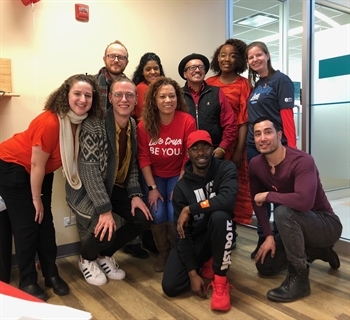A Culturally-Conscious Approach to HIV in the Black Community
Erie Family Health Centers
Published: April 8, 2021

Erie's Lending Hands for Life team.
Erie Family Health Centers
HIV is a virus that disproportionately affects our Black communities, and Chicago is no exception. One in two Black MSM (men who have sex with men) will be diagnosed with HIV in their lifetime compared to one in four Latino MSM and one in eleven White MSM (CDC). In addition, another group disproportionately impacted by HIV is Black transwomen; an estimated 44% of Black transwomen are living with HIV (CDC).
Recognizing these racial disparities, Erie Family Health Centers treats the HIV epidemic as a social issue, as well as a healthcare issue, providing culturally-conscious HIV/AIDS care to Chicagoans. Below is a Q&A with Erie’s Associate Director of Patient Programs & Health Equity, Bridget Magner, answering questions about Erie’s nationally-recognized Lending Hands for Life HIV/AIDS program and what it really means to offer culturally-conscious care and support.
One of the terms used to describe the Lending Hands for Life program at Erie is ‘culturally-conscious’. What does that buzzword mean exactly, and why is it so important to apply it to the services you and your team provide to Chicagoans?
Bridget Magner: A culturally-conscious approach is one that acknowledges that there are many cultural and socioeconomic factors we must consider when caring for and supporting individuals; it is not one-size-fits-all. Culturally-conscious care has historically been overlooked in our healthcare system, and we see the devastating, long-lasting effects in our communities. We find it extremely important at Erie to provide safe, inclusive and culturally-conscious HIV/AIDS services for this very reason; everybody has different healthcare experiences that are dependent on their unique lived experiences, and these experiences need to be taken into consideration to offer the best care and treatment options for each individual.
What does culturally-conscious care look like for HIV/AIDS patients at Erie?
BM: A really great example is that we are sometimes met with a lack of trust from our patients from the Black community due to a general and valid mistrust of the medical system. In response, we have allowed Erie to be a space where skepticism is welcome, and questions are strongly encouraged. We understand the flaws within the medical system and have compassion for these valid concerns. We allow each individual to take their time to be comfortable their health status and treatment and support options, and we spend a lot of time talking with our patients and ensuring they are a partner and a leader in the decision-making around their care.
Understanding the impacts of stigma also plays a major role in our culturally-conscious approach to care. Stigma from within certain communities may deter individuals from seeking out or continuing treatment. Knowing this, we never consider a patient as “inactive” unless we know that they are receiving treatment elsewhere. We will never give up on a patient and will continue to reach out to be their support and help them receive the care they need.
Additionally, we recognize that some patients have other concerns, such as housing, employment or food accessibility, that take priority over their healthcare needs. Knowing this, our case managers work directly with our patients to connect them to any resources they may need, which in turn helps our patients get to a place where they can engage more in their treatment and live their healthiest lives.
How does Erie help patients with potential systemic barriers to quality treatment such as cost and accessibility?
BM: Erie cares for everyone, regardless of their insurance status, immigration status, or ability to pay. We work closely with our patients and connect them to services that can help cover the cost of HIV treatment. For patients interested in HIV prevention, we can also help connect patients to assistance programs to cover the cost of the PrEP.
Erie offers free HIV testing for everybody – you do not need to be a patient to take advantage of this service. We have at-home HIV test kits that we can mail directly to your home. These are available on our website.
I’m sure diversity also plays a major role in culturally-conscious care. How does your team address this?
BM: We know how much representation matters, especially in healthcare and in support systems in general. Therefore, we have assembled a diverse team to ensure that all our patients are able to connect with our staff and have authentic and honest relationships that help them lead a healthy life.
At Erie, we strive to have a diverse staff, fostering an inclusive culture where everyone feels they belong and will receive high-quality healthcare.
If people are interested in learning more and connecting with your team, where should they go?
BM: People can visit our website at Erie.Health/LHL or call us at 312-432-2699 (English) or 312-432-7220 (Spanish). Interpretation services are available for all other languages.
Keywords:
health, health and wellness, health care, health chicago, Health Equity, healthcare, Healthy Community, HIV, Support
Posted in Healthcare/Health Resources